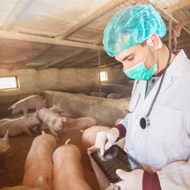SRUC to invest in new research facility

The centre will combine multidisciplinary strengths in veterinary disease surveillance, research, education and rural business consultancy.
Scotland’s Rural College (SRUC) has announced that it will be investing £2m into a new Centre of Excellence for Digital Agriculture and Animal Health.
Confirming plans on its website, the college said the centre will expand their existing research and commercial operations and will also improve scientific and education services.
Housed on Highlands and Islands Enterprise’s (HIE) Inverness Campus, the centre will combine multidisciplinary strengths in veterinary disease surveillance, research, education and rural business consultancy.
Professor Jamie Newbold, SRUC’s academic director, said: “We’re very excited about this new development in our partnership with HIE. SRUC has an ambitious regional, national and global strategy to increase its positive impact on rural economies.
“Key to our new strategy is collaboration with existing and new partners, achieved through the sharing of expertise, resources and facilities. Our new Centre will open up huge opportunities and give us the scope to deliver new services. Examples include the harnessing of ‘big data’ and digital technology for use in research and education and improvements in the responsiveness and impact of the advisory services we offer to local farmers.”
HIE’s Ruaraidh MacNeil, project director of Inverness Campus, said: “We are delighted to be working with SRUC on its plans for expansion at the Campus. SRUC is already involved in a variety of collaborative projects at Inverness Campus working with other academic institutions, NHS and commercial companies.
“These plans bring more opportunities to expand this joint working and boost the Campus animal health offering. SRUC has been a key member of the Inverness Campus Partnership Forum since its inception in 2010.”



 The Animal and Plant Health Agency (APHA) has updated its online reporting service for dead wild birds.
The Animal and Plant Health Agency (APHA) has updated its online reporting service for dead wild birds.